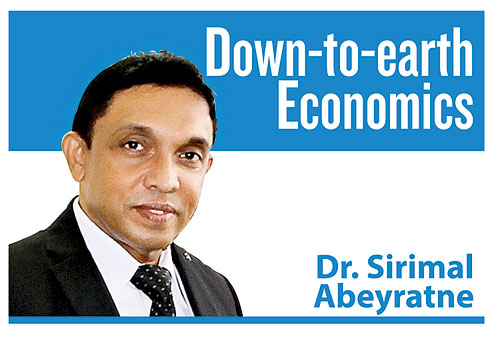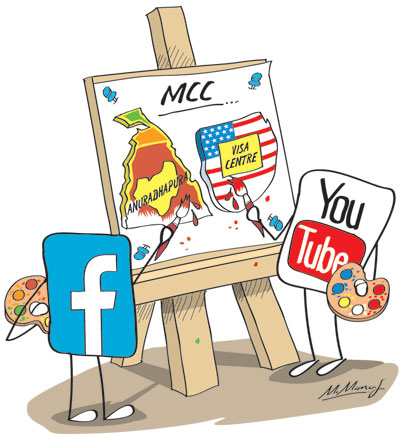Right to misinformation
View(s):It was after I wrote on the Millennium Challenge Corporation (MCC) Compact grant under the title “Transport corridors and elephant corridors” in this column on September 15, that this commentary opened the doors to a couple of follow-up interviews.
One of the interviewers asked me: “If Sri Lanka accepts this grant, according to various reports and social media, the country will be divided into two pieces, acres of our land will be sold out to the US, and we – the Sri Lankans, will have to get American visas to go to Anuradhapura. What is your response to these claims?”
 I replied: “I don’t think they had even seen the MCC agreement, which is not yet released to the public. This is like ‘throwing a lit match stick to the Amazon forest’. The source of origin is difficult to identify. Finally, the Amazon forest is on fire but none is responsible and accountable”.
I replied: “I don’t think they had even seen the MCC agreement, which is not yet released to the public. This is like ‘throwing a lit match stick to the Amazon forest’. The source of origin is difficult to identify. Finally, the Amazon forest is on fire but none is responsible and accountable”.
Last week, it was reported that the Cabinet has approved the MCC agreement, and that the agreement was also released to the public.
I thought of referring to the MCC grant again, not to take part in any debate, but to expose an important development issue: “How difficult it is for a country with weak democratic institutions to become a developed nation”.
Throwing a lit match stick
Last July, “a lit match stick” was thrown into a social media platform. The comment went viral and, perhaps, became one of the sources of “wildfire” on the MCC grant. The ideas as such were articulated rationally into a doctrine by the parties with vested interests, comprising some professionals, some politicians, some intellectuals, and some opinion-makers. At a time when the MCC agreement was also not available for verification, the propaganda spread freely like a wildfire.
 What came through one of the social media platforms included the following: “…the MCC agreement is nothing but a plan to splinter Sri Lanka and turn it into a US Military Base”. Then it went on to explain the alleged key points of the MCC grant in order to substantiate the above claim. Some of these key points are as follows:
What came through one of the social media platforms included the following: “…the MCC agreement is nothing but a plan to splinter Sri Lanka and turn it into a US Military Base”. Then it went on to explain the alleged key points of the MCC grant in order to substantiate the above claim. Some of these key points are as follows:
“…The Americans demanded from Sri Lanka an Economic Corridor of 1.2 million acres of land from Trincomalee to Colombo for a lease period of 200 years and they insisted that US law must prevail within this corridor. The US has offered US$400 million for the corridor which works out to Rs.24 per acre per month. It appears that Sri Lanka has been offered $80 million more. The construction of an Electrified Railway Line from Trincomalee to Colombo protected with electric fences on either side, which will effectively physically split the country into two. Anuradhapura and Kurunegala will be in the north of the corridor. The allegations above if true, show that it is an agreement that destroys the sovereignty and territorial integrity of Sri Lanka.”
“Given the grave nature of the allegations, it is imperative that the government immediately reveal the contents of the agreement without any redactions to the general public. We strongly request the government to do so immediately and all political and national leaders to recognise the dire implications of the agreement to the national sovereignty and take all steps to reject and repeal the agreement with MCC.”
Here goes the “devil”
After the Cabinet approval, the agreement was released to the public. It comprises a grant of $480 million to Sri Lanka for a period of five years in order to complete two projects: The first is a transport project in Colombo and suburbs at a cost of $350 million, and the second is a land project for the country at a cost of $67 million.
The transport project is aimed at developing an Advanced Traffic Management System, modernising the present Public Transport System, and developing the Ring Road Network in the Western province. The land project is aimed at digitising land records, inventorying state lands, establishing a computerised Title Registration system, and improving land valuation system.
According to the MCC agreement which is available to the public now, there is neither an economic corridor nor electrified railway link. There is no map showing the divided country into two pieces with an electrified fence between Colombo and Trincomalee, contrary to what was displayed at media briefings and social media.
There is no land deal between Sri Lanka and the US in the MCC agreement; therefore, the issues of land valuation as Rs.24 per acre or otherwise, and the issues of environmental and wildlife threats do not arise either.
Democracy and discipline
It was last week at a roundtable discussion on the Port City, organised by the Pathfinder Foundation that a fundamentally valid point was raised by a panel member: Referring to Sri Lanka’s post-independence development history; is it possible for a country like Sri Lanka with this kind of “free-democratic set up” coupled with a “weak political leadership” ever to become a developed country?
There is no need to elaborate the validity of the point, and as it was referred to, the post-independence development history of Sri Lanka itself has confirmed and re-confirmed it throughout the past 70 years.
There is no shortage of “misinformation” nowadays, and there is no shame and fear of “false- witness” aimed at deceiving the public either irrespective of the magnitude of the damage that it can cause. It’s considered to be the “right to express an opinion”, which is an integral part of a democratic political set up.
Democracies are more vulnerable to diverse public opinions whether they are right or wrong, compared to totalitarian states. Because of that, the democracies require strong regulations and institutions to maintain discipline much more than in totalitarian states. Otherwise, the state-failures accompanied by weak democracies in the long-run will eventually lead to self-destruction; Sri Lankan history with many facets of conflicts in the form of youth insurrections and separatist wars has no shortage of examples.
Global issue
With widespread free media platforms, “misinformation” has become a global issue, threatening not only development, but also the political stability.
For this reason, governments around the world are concerned with the misinformation issue, and more than 40 countries have already stepped into action: Some countries have created state-sponsored social media accounts to surface and debunk online misinformation. Some countries have taken steps to revise their existing penal codes to punish the culprits spreading misinformation. Unlike in the past, more governments are now opting to restrict the rights of false opinions and expressions, affecting media freedom as well.
In March 2018, the European Commission published its “Final report of the High Level Expert Group on Fake News and Online Disinformation”, with contributions of experts from around the world to provide guidelines to address the issue of misinformation.
It was Singapore that took one of the bold and controversial steps to pass a new law that outlawed the spread of false information – the Protection from Online Falsehoods and Manipulation Act (POFMA) that came into effect last month, October. The law has three tiers of sanctions; a fine of up to S$37,000 or five years in prison for sharing false information, S$74,000 and a 10-year jail term for using fake accounts or bots and fines of up to S$740,000 and 10 years in prison for tech platforms that don’t remove such content.
Bound to fail
World opinion is moving in favour of “the need for discipline” in democracies, although there may be differences of opinion about the different actions taken by different countries. Democracy is, after all, neither the status of indiscipline nor the status of lawlessness. The countries which fail to establish a political and social order with such standards are bound to fail, too.
(The writer is a Professor of Economics at the University of Colombo and can be reached at
sirimal@econ.cmb.ac.lk)


